A Choice Not an Echo on the UAW Strike
Think of tonight’s debate as test of whether the GOP will offer the American people a choice for which party can defend workers best or an echo of a misremembered past.
The Republican Party has talked a very good game in recent years about representing the working men and women of the United States, especially in the industrial sector. Now the United Auto Workers union is engaged in an historic strike against all three of the Big Three auto corporations—the first time the union has faced down all three at once—and Republicans have the opportunity to show that their pro-worker stance is more than rhetoric.
This should not be difficult for the Republican hopefuls who will take the stage at the Reagan Library Wednesday night. The principle demands of the union arise from the policies of President Joe Biden. Pay has not kept up with the massive surge of inflation, and the Biden administration’s campaign to push Americans into electric vehicles threatens union jobs.
You can add to that the need to protect American workers from the depredations of predatory mercantilism practiced by the communist regime in China. While the Biden administration has surprisingly kept the Trump tariffs in place—with very little pushback from the establishment media that once proclaimed these were an existential threat to world order—it has failed to expand these despite China’s recalcitrantly belligerent economic policies.
Republican presidential hopefuls who express solidarity with the cause of the union workers seeking a restoration of cost of living adjustments—while blasting the incumbent president for the reckless spending spree that sent inflation soaring—will be making the case for their leadership not only to the UAW but to all Americans beset by Bidenflation. As we’ve detailed in earlier editions of Breitbart Business Digest, the American industrial heartland has been particularly hard hit by inflation, and the wage increases sought by the UAW are not all that extraordinary given how much Bidenflation has set them back.
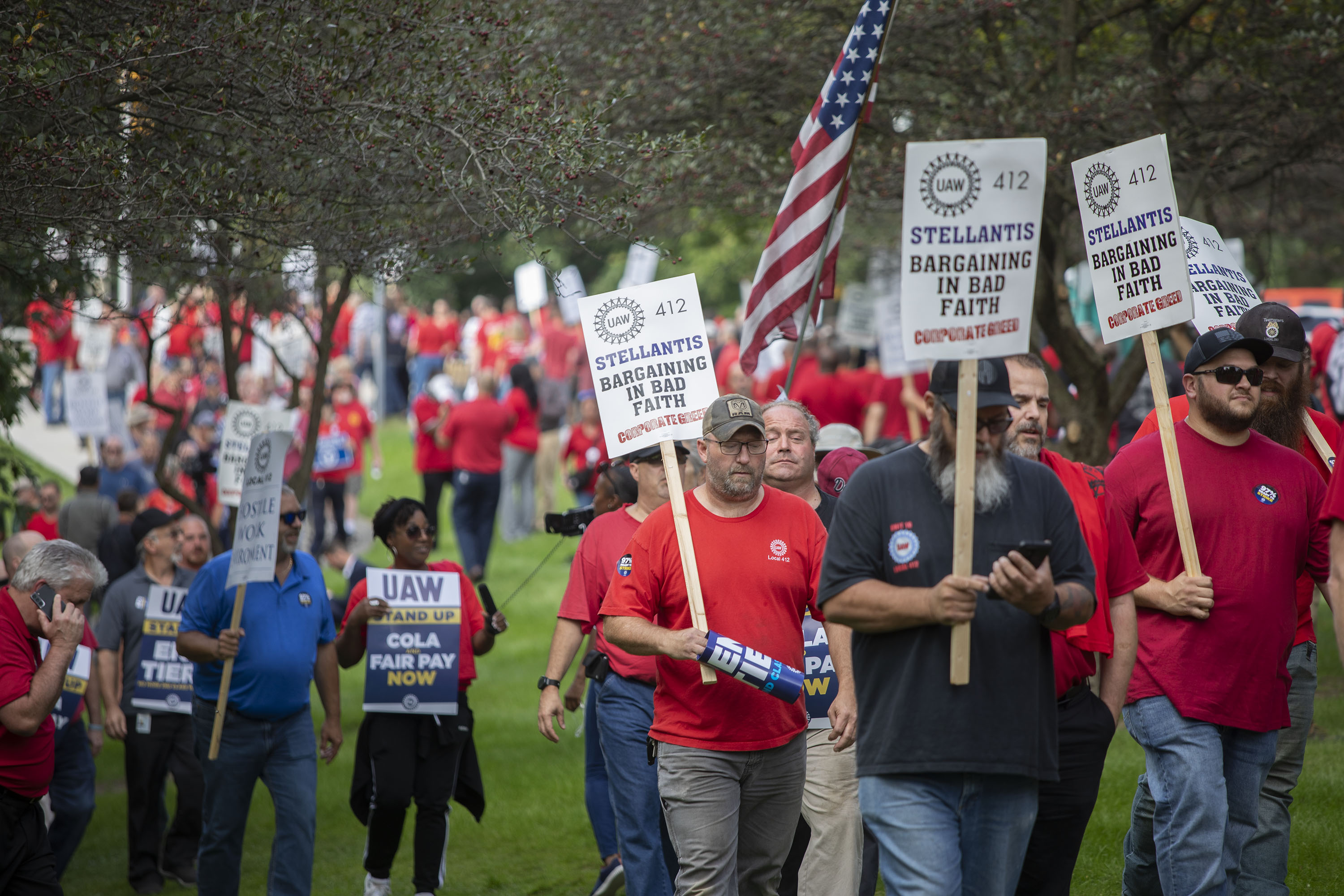
United Auto Workers members and supporters rally at the Stellantis North America headquarters on September 20, 2023, in Auburn Hills, Michigan. (Bill Pugliano/Getty Images)
Here’s what we wrote on September 14:
All that [the government’s long-established crediblity at holding inflation low] changed shortly after Joe Biden took control of the White House and pressed a Democrat-controlled Congress to enact the $1.9 trillion American Rescue Plan Act. Inflation went from 1.8 percent in 2019 to seven percent in 2021. (It had fallen to 0.3 percent amid the lockdowns in 2020.) Despite assurances from the Biden administration and the Fed that inflation was a passing phenomenon—transitory, they said—inflation persisted, clocking in at 6.5 percent for the full year in 2022.
It was even worse in the Detroit region that is America’s automaking heartland. While inflation peaked at 8.9 percent year-over-year in June of 2022 for the U.S. as a whole, in the Labor Department’s Detroit-Warren-Dearborn district, it rose all the way to 9.7 percent. Over the last 12 months, while nationwide 12-month inflation has fallen to 3.7 percent, in Michigan it is running 5.9 percent.
While all Americans have been hard hit by the surge of inflation tied to Biden’s deficit spending, Detroit’s autoworkers have had it far worse than most of their fellow Americans. The place we once called the Arsenal of Democracy was ground zero for Bidenflation’s destructive explosion.
In short, although the union is seeking a large increase by the standards of the low-inflation decades that preceded the current era, those standards do not apply. The UAW members need a large increase just to make them whole after Bidenflation ate away their paychecks and also to secure their future against inflation that is likely to persist at a high level for at least the next few years.
It is true that Shawn Fain, the UAW president, appears to have a pathological hatred of Republicans—and Donald Trump in particular. Recently he complained that Trump did not take to the picket lines during the 2019 strike, something no president had ever done until Joe Biden broke with the tradition of the presidential neutrality in labor-management relations this week. But Fain’s UAW members do not despise Republicans—and many of them would likely vote for a GOP presidential candidate named Donald Trump or one who promises to take a similarly hawkish Trumpian stance on trade and a program to rebuild of America’s industrial might.
Republicans Are Confused About Their Own Past
Unfortunately, some Republicans seem bent on attempting to push the strike of today into faultily remembered moulds of the past. Sen. Tim Scott (R-S.C.) appears to have proposed firing strikers. At a campaign event in Iowa, Scott reportedly said, “I think Ronald Reagan gave us a great example when federal employees decided they were going to strike. He said, ‘You strike, you’re fired.’ Simple concept to me, to the extent that we can use that once again.”
The analogy breaks down on many levels. In the first place, the autoworker strike is between two private sector groups, the car manufacturers and the union that represents their workers. The 1980s air traffic controller strike was against the Federal Aviation Administration. The controllers were federal employees who were prohibited by law from striking. They were demanding a larger share of taxpayer funds rather than of the profits of the private enterprise for which they worked.
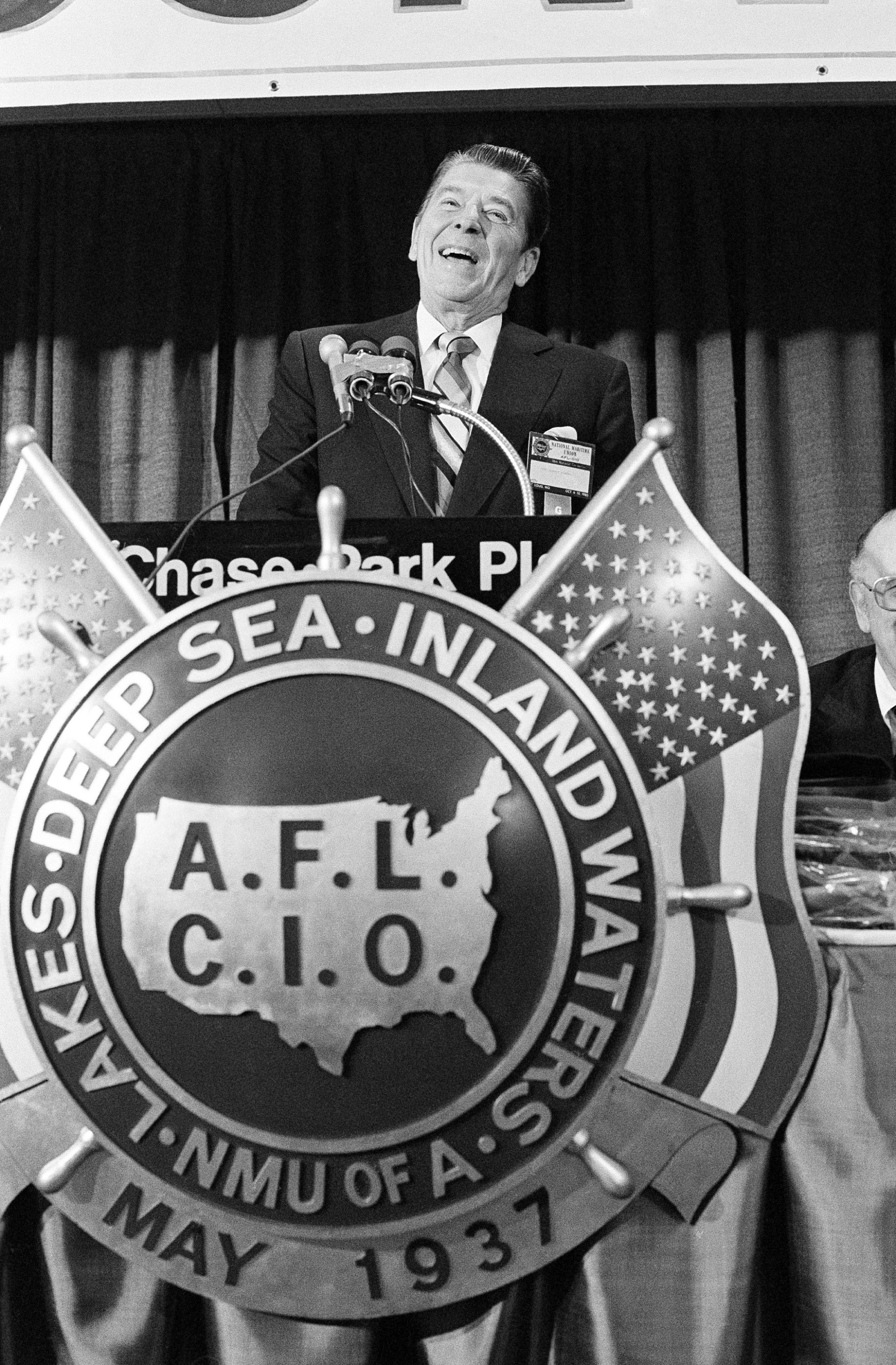
Republican presidential candidate Ronald Reagan receives a standing ovation and an endorsement from the 35,000-member National Maritime Union in St. Louis, Missouri, on October 9, 1980. (AP Photo/Charles W. Harrity)
Nikki Haley, the former UN ambassador and South Carolina governor, found fault with Biden for being “pro-union”—a mischaracterization of a president whose policies have devastated real wages of union workers and threatened their jobs in pursuit of an extremist Green New Deal agenda.
“When you have the most pro-union president and he touts that he is emboldening the unions, this is what you get,” Haley said shortly after the strike began. “The union is asking for a 40 percent raise; the companies have come back with a 20 percent raise. I think any of the taxpayers would love to have a 20 percent raise and think that’s great.”
The insertion of “taxpayers” here is telling. It appears that Halely has once again confused a private sector union for a public sector union. She’s also appears to be downplaying the impact of inflation on workers paychecks, which is functionally a defense of Bidenflation. According to the estimates of the Economic Policy Institute, “auto manufacturing workers have seen their average real hourly earnings fall 19.3 percent since 2008.”
Make the GOP Great Again
There’s no reason for the GOP to side with General Motors, Ford Motor Co., and Stellantis against the UAW.
If GOP candidates are looking for a model of leadership here, they can recall Dwight Eisenhower. Running for president in 1952, he addressed the national convention of the American Federation of Labor (AFL).
“Today in America unions have a secure place in our industrial life,” Eisenhower told the AFL delegates. “Only a handful of unreconstructed reactionaries harbor the ugly thought of breaking unions. Only a fool would try to deprive working men and women of the right to join the union of their choice.”
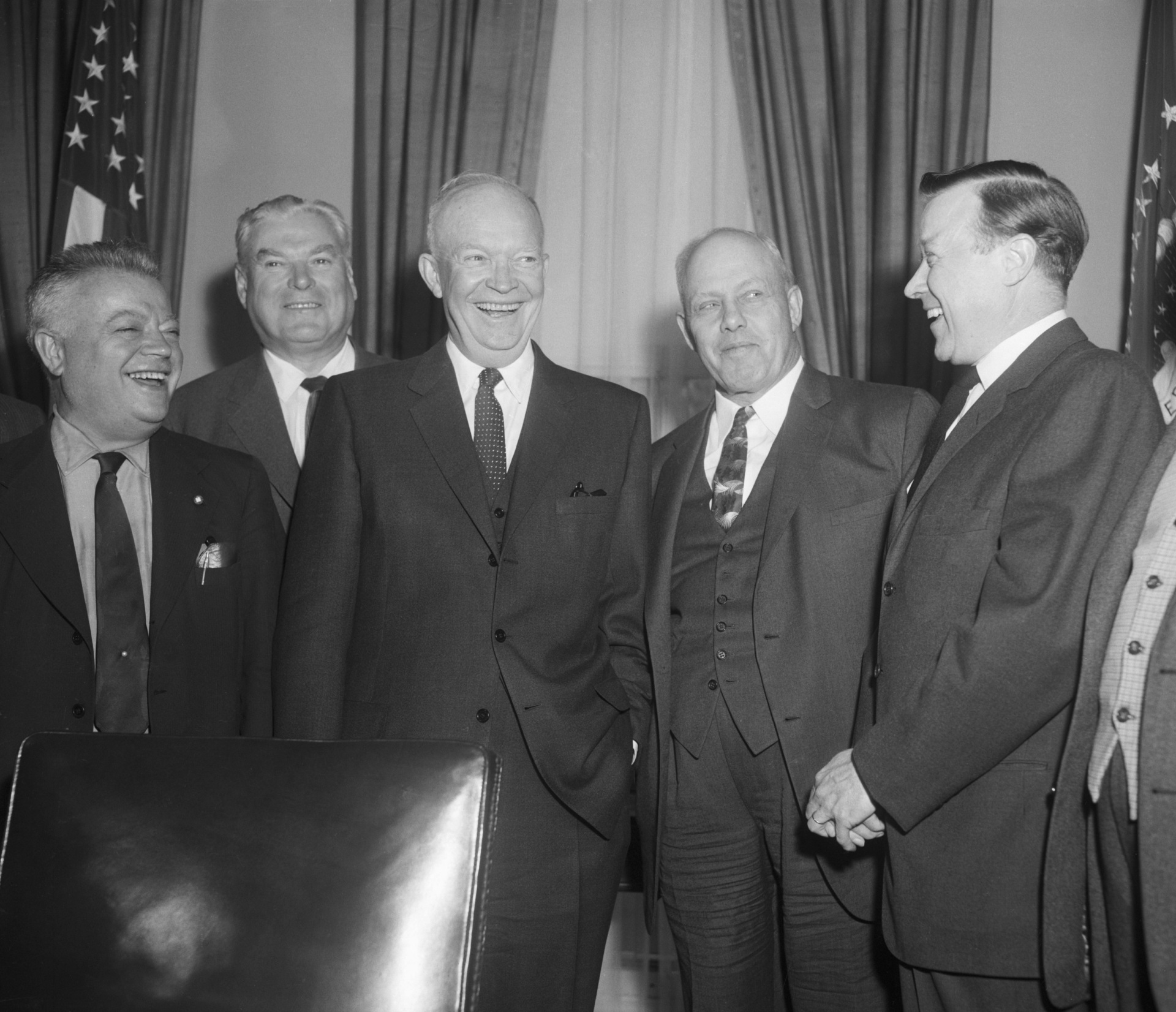
President Dwight Eisenhower meets with union leaders at the White House on March 14, 1953, including (from right to left) United Auto Workers president Walter Reuther, AFL-CIO president George Meany, United Steel Workers president David J. McDonald, and International Ladies Garment Workers Union president David Dubinsky. (Getty Images)
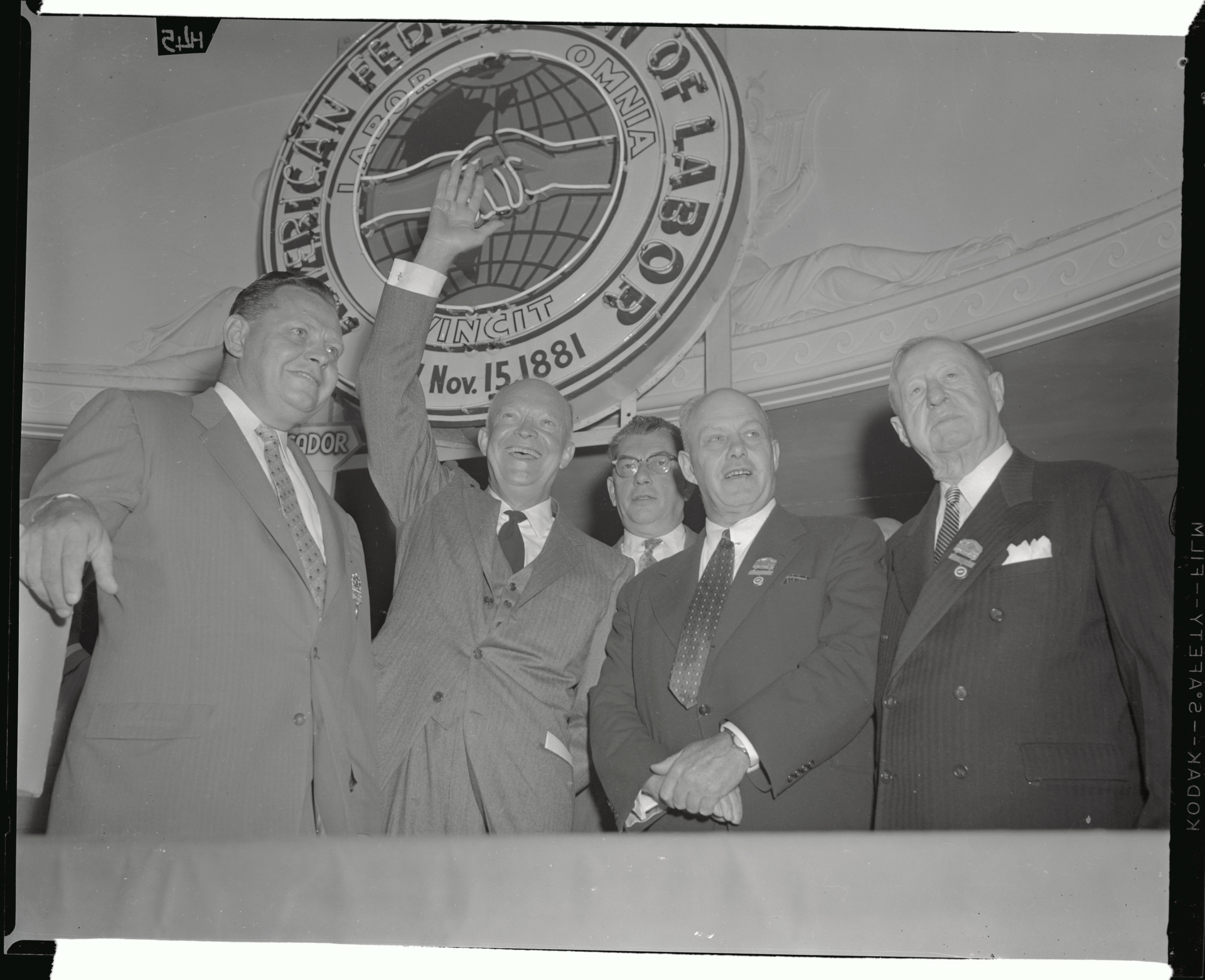
President Eisenhower waves a greeting to AFL delegates upon arriving to address them on September 24, 1954. The president was escorted to the speaker’s stand by AFL Secretary Treasurer William Schnitzler (left) and AFL President George Meany (right). (Getty Images)
Polling indicates that an overwhelming share of Americans support strong labor unions. We live in an age in which Americans are increasingly seeking leadership that will bring the country together for the collective purpose of restoring the nation. You know, that whole “make America great again” thing. Fighting against the turn toward economic nationalism will be a losing battle.
Republicans tonight have the chance to make the GOP great again on labor issues. The question is whether they are smart enough to take up that chance.
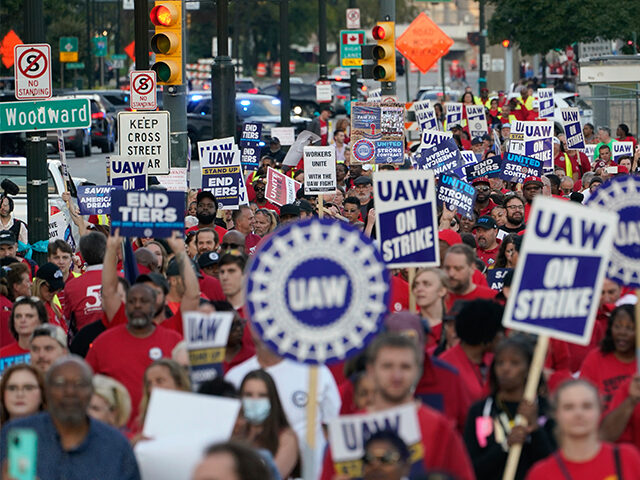
COMMENTS
Please let us know if you're having issues with commenting.